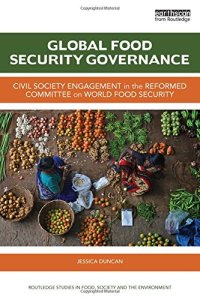
Ebook: Global Food Security Governance: Civil society engagement in the reformed Committee on World Food Security
Author: Jessica Duncan
- Tags: Environmental Economics Business Money Industries Agriculture Automotive Computers Technology Energy Mining Fashion Textile Financial Services Hospitality Travel Tourism Industrial Relations Manufacturing Media Communications Museums Performing Arts Pharmaceutical Biotechnology Restaurant Food Retailing Service Sports Entertainment Transportation Reference Test Preparation Almanacs Yearbooks Atlases Maps Careers Catalogs Directories Consumer Guides Dictionaries Thesauruses Encyclopedias Subject
- Series: Routledge Studies in Food Society and the Environment
- Year: 2015
- Publisher: Routledge
- Language: English
- pdf
In 2007/8 world food prices spiked and global economic crisis set in, leaving hundreds of millions of people unable to access adequate food. The international reaction was swift. In a bid for leadership, the 123 member countries of the United Nations’ Committee on World Food Security (CFS) adopted a series of reforms with the aim of becoming the foremost international, inclusive and intergovernmental platform for food security. Central to the reform was the inclusion of participants (including civil society and the private sector) across all activities of the Committee.
Drawing on data collected from policy documents, interviews and participant observation, this book examines the re-organization and functioning of a UN Committee that is coming to be known as a best practice in global governance. Framed by key challenges that plague global governance, the impact and implication of increased civil society engagement are examined by tracing policy negotiations within the CFS, in particular, policy roundtables on smallholder sensitive investment and food price volatility and negotiations on the Voluntary Guidelines on the Responsible Governance of Tenure of Land, Fisheries and Forests in the Context of National Food Security, and the Global Strategic Framework for Food Security and Nutrition.
The author shows that through their participation in the Committee, civil society actors are influencing policy outcomes. Yet analysis also reveals that the CFS is being undermined by other actors seeking to gain and maintain influence at the global level. By way of this analysis, this book provides empirically-informed insights into increased participation in global governance processes.